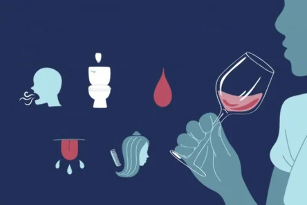
Many people don't drink alcohol during the work week, but allow themselves to relax on the weekends with a few stronger beers or drinks per day. It should be noted that this approach is dangerous and can cause health problems. This is because it is difficult for the body to process a large amount of alcohol that has been received within 2 days.
To avoid serious problems, you need to know what a safe daily dose of alcohol is.
Don't drink how much alcohol
I'll be right away - there is no consensus on this matter. Some scientists say that even in small amounts, alcohol can have devastating effects on the body. Others believe that in small doses, alcohol is even beneficial. And there is a WHO recommendation (World Health Organization) thatdangerous dosage of alcoholis 60 ml of ethanol for menand50 mlfor women. But since very few people consume ethanol in its pure form (I hope), here's how a completely dangerous drink-side dose of alcohol is familiar to most:
- 180 g vodka for men and 150 g vodka for women
- 1, 5 l. beer
- 0, 5 l. wine
Absolutely dangerous dosage of alcohol- mean value of the amount of alcohol consumed, sufficient to lead to death.
But don't think that if you drink less than these values nothing will happen to your body. Even if you consume the equivalent of 30 ml of ethanol per day (90 g of vodka, 800 ml of beer or a large glass of wine), you can seriously harm your health.

The formula for determining the proportion of specific alcohol
Medical professionals have developed a formula that can be used to calculate an individual's alcohol intake. Using this method, you can independently determine how much alcohol you can drink each day without harming your health.
Basically 1. 5 g of ethyl alcohol per kilogram of body weight. If a person weighs 70 kg, the individual dosage of ethanol is 105 ml. In any case, it must be understood that these values are averaged, as it largely depends on the age, sex and physiological characteristics of the organism.
What if you drink alcohol every day?
Scientists have been studying this problem for a long time. Recent evidence suggests that alcoholreduces the risk of atherosclerosis. In part, it helps to avoid clogging of blood vessels by cholesterol plaques. Why is cholesterol dangerous? It causes circulatory problems. The blood cannot circulate normally through the vessels, as they are full of cholesterol and the person can even die. On the other hand, alcohol "clears" blood vessels and does not allow cholesterol to build up.
Does this mean you can drink alcohol every day? Are not. In this case, we are talking about extremely low doses of alcohol. Based on similar recommendations fromWHO, experts recommend at least two days a week tocompletely abstain from alcohol. Of course, the longer you don't drink, the better.
Optimal dosageof alcohol, is not harmful to health and may even provide certain benefits,is considered 150 mldry red wine.
But this doesn't mean you need todrink every daya small glass of wine, even though there are many stories circulating online about a certain old man drinking one everydays and live to 90 years old. Everything is personal here and there is a need to take into account many factors - from chronic illnesses to genetic predisposition. Not to mention the fact thatalcohol is contraindicatedin adolescents and pregnant women.
Did you know that alcohol stays in your hair the longest?
If you drink alcohol every day, your body will not be able to get it out of your body, and a disease like alcoholism will begin. It has 3 phases, and in this article we will cover them. But first, let's find out - how does alcohol in general affect a person?
A great intoxicating drink that has been known for millennia, although it is called differently in each country: digestive, ale, braga, v. v. In ancient times, it was believed that the drink with amber helped to improve appetite, enhance health, help with growth and development, thus the standard for giving it to children. Beer can delight you all day hot and cool evenings. For example, in the mid-20th century in Italy, they were encouraged to indulge themselves throughout the year, not just during the hot summers. At that time, beer was associated with urban lifestyle, fashion trends, and progress. And now there are many connoisseurs of this effervescent drink, convinced that it can be enjoyed with breakfast, lunch and dinner.
Famous joke "There are 24 hours a day, there are 24 bottles of beer in a barrel - a coincidence? " this confirmed. But the joke is a joke, from saliva you can get unhealthy problems if you don't know how to. In this article, we will explore the benefits and harms of this drink, in what amounts and whether it can be consumed and whether there are any contraindications.
How alcohol works

The brain of the average person and the alcoholic. In the latter case, most of the connections in the brain are destroyed
What is wine in the scientific sense? This isethyl alcohol, made by fermenting sugar, yeast and starch. And all this "nuclear" mixture has one amazing property: it goes through all stages of digestion incredibly quickly. That is, while you are digesting the lunch soup (about 30 minutes) or the chicken (up to 2 hours), the alcohol quickly reaches its goal - the human circulatory system, sometimes even giving up. through the liver, if you drink in severe severity. She simply couldn't infuse such a large amount of alcohol into her body.
Alcohol starts to have a bad effect on the circulatory system: it damages red blood cells (the small organs that make up blood), which is why they stick together, forming blood clots. . The blood clot, in turn, blocks the flow of blood in the small arteries, and this leads to a blockage of blood vessels in the brain. Thus, a feeling of intoxication occurs, similar to when the brain lacks oxygen.
The red blood cells of a person who has been drinking a lot. They are almost stick together
Therefore, if you don't drink in moderation, your brain will be continuously in this state. This will lead to deterioration of many mental and physical functions - a condition equivalent to drinking a lot of alcohol at once. A person cannot stand on his or her feet normally and cannot explain his actions.
Scientists have shown that alcohol damages DNA and increases the risk of cancer.
Beer in the modern world
Any store today offers a wide variety of wines. To make the right choice, you need to understand what types of foam are and how they differ. Beer can be divided into 2 categories: simple and powerful.
Beer usually contains less alcohol, about 4%. It is divided into 2 categories: light and dark. The strength of the fresh drink can reach 8 percent.

Strong beverages can contain up to 12 percent alcohol. It differs from the simpler one in that it has a slightly bitter taste, aroma and finish.
This drink is considered wholeness. It's worth noting that about 90% of the classifications provided to customers refer specifically to the whole. The average alcohol content in this form is about 7 percent.
Stages of alcoholism
Drinkingcontinuously leads to alcoholism, which has three stages.
- With an alcohol-dependent, a person gradually loses control over the amount of drinking when drunk, leading to a pathological cravings for alcohol.
- Atsecond stage, a person even developed an "immunity" to alcohol, or rather to him. Indeed, if a person at this stage consumes more than 1 liter of alcohol, the body will likely begin to feel alcohol more easily. In fact, this hides the development of serious diseases - hepatitis, cirrhosis, cancer of the esophagus and cancer of the stomach.
- Alcoholismin the third stageis characterized by a complete deterioration of the physical and mental personality. A person can no longer drink and in most cases dies.
Scientists believe that alcoholism is influenced by genetic predisposition due to insufficient production of alcohol-converting enzymes. But in fact, the amount of alcohol consumed affects this. You just don't need to drink if you realize that you are losing control and having an unpleasant state in your body.

Alcoholism is a disease and must be treated
Benefits of drinks
Strangely, beer also has valuable health benefits, but most of them have nothing to do with drinking beer. It is used externally:
- Beer foam is used to smooth wrinkles for the mask to improve the skin's condition.
- Beer is an essential ingredient in the hair mask, helping to keep hair healthy, fluffy and soft.
- If a person with acute respiratory infections drinks a little warm beer, recovery and improvement of health will be faster.
- A reasonable beer dose will help remove toxic heavy metals from your body, so drink beer at an acceptable level and your kidneys will be healthy.
- If you drink beer from time to time, due to the silicon content in it, your bones will become stronger.
Keep track of your health!
WARNING! The information published in this article is for informational purposes only and is not intended to be used as a guide. Be sure to consult your physician!
Why did the hangover happen?
This question was asked by a lot of people the next morning after a rowdy party (usually accompanied by the phrase "um, I definitely won't drink anymore"). In fact, the explanation is quite simple: alcohol enters the body's bloodstream terribly quickly, but VERY slowly. And the human body cannot fully recover from a stormy night until the substance is completely destroyed and digested. Here's how hangoverhappened.
Last year in our country, they tried to make a beer that was not fed up with vitamins. I wonder if they did that?
Surely many people have asked,how to avoid hangover, before starting to celebrate the next event with alcohol. But the answer can be summed up in one sentence: don't drink in bulk, and then the alcohol will have time to leave your body before your head hits the pillow.
How to drink alcohol?
The researchers differentiate between the so-called "northern" drinking pattern and the "south" pattern. The first includes Belarus, Kazakhstan, the Baltic states, which drink a lot of alcohol and in shocking doses, and not always. The "south" model is typical for Spain, Italy, and Greece, where they can drink more often, but with less and less strong alcohol: for example, a glass of dry wine at dinner. No one takes 100 g of vodka a day.Scientists agree that the southern model is safer for health, although they still note that drinking alcohol on a daily basis is bad for health. So, don't overdo it.
Historical data
Beer is one of the oldest drinks. According to history, it was first prepared about 8000 years ago. It should be noted that at that time women are only engaged in the production of beverages. It is produced mainly at home. Only after beer became popular and started to be sold did the men become interested in the manufacturing business.
Of course, brewing is nowadays considered an exclusively male profession, although, as is known from history it all started in a completely different way. Much of the drink has been made since the Middle Ages, and is famous for its great flavors in England, Czech Republic and Germany. Because of that, these countries have not lost the title and continue to produce a delicious drink.
This is common in many countries. People who can brew beer are appreciated. Many different ingredients have been selected for the production, so the taste of the beer differs.


























